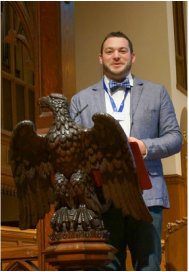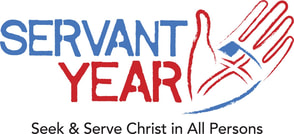 Sermon preached at Christ Church Cathedral for the 2015 Forma Conference, January 30, 2105. Andrew Kellner, Canon for Family & Young Adult Ministries Episcopal Diocese of Pennsylvania Mark 1:21-28 “The people were amazed by his teaching, for he was teaching them with authority...” In the name of our God, Father; Son; and Holy Spirit. Amen. Why is it that today the Church is increasingly not seen, as a true and good discussion partner in asking and answering some of life’s most important questions? For that matter, why are we not asking them? I have spent the past seven year ministering in and with the Episcopal Church. I even joined up! Prior to this however I had grown up and moved through communities of faith where certainty was the goal and the object of that faith, much as Brene Brown described yesterday morning. Some of you, I am sure had similar experiences. My teachers, mentors, pastors, priests and parents all served as authorities, providing certainty in the midst of an uncertain world. Then at the age of twenty-two, I packed my belongings and moved from Northern Michigan to Lackawanna, New York,a small steel mill town that shares a border with Buffalo, along the shores of Lake Erie. I had been hired to work at Baker Victory Services, a Roman Catholic residential facility for adolescents with multiple psychological diagnoses. I began to lead a local youth group, and would often take young people from Baker with me to the group. It was not at church or in that youth group, but rather in the cottages at Baker, that over the course of the next two and a half years, that all the certainty that I had been given and latched onto for so long, began to melt away. You see the platitudes and slogans of certainty, are not helpful when you hold a teenager in your arms as they wrestle with the value of their own life. Words provide no certainty in the midst of deep heartache and pain, but rather melt away leaving one’s own soul bare and broken. The certainty of doing, being and saying the right thing crumble, and you are left to face your naked self, with the baggage of shame, so closely linked with certainty. And yet time and time again we reach back, putting back together the rubble of our certainty, trying to protect ourselves and fearing to grieve; to forgive and to let go. The desire and pull towards certainty is so often misconstrued today as authority. To teach with authority is seen as providing certainty and being concrete. As a culture we have trusted that concrete certainty makes for the very best or perhaps even the only foundation for life and for faith. Perhaps we have the scriptural children’s song all wrong: “The wise man built his house upon the rock… the wise man built his house upon the rock… the wise man built his house upon the rock and the rains came tumbling down.” Concrete certainty, is not the rock to which the song refers, but so very often it takes its place. And this false rock of concrete certainty provides little foundation for a dynamic and living faith shaped by the experience of encountering God. For the idea of Jesus is not the same as the living Jesus. And yet the idea of Jesus or ideas about Jesus, so often serve as the touchpoints and fabric of religious formation and education. Often times without our even acknowledging it. Many of us, especially we Episcopalians, tend to shy away from the idea and reality of teaching with authority, as we have gotten bogged down in the Myth of Authority. This Myth of Authority says that:
This is the Myth of Authority, the myth that authority equals certainty. And in places where this myth has become reality, authority constricts and confines, rather than its rightful acts of setting right, setting free, healing, and bonding together relationships. You see there is not only the danger of giving life and reality to the Myth of Authority; there is also the danger of failing to act and teach with authority, because of the fear of this myth. But when we teach with true authority we provide relationships in which to wrestle with the questions of our deepest meaning. Places where we hold up principles and ideals, for each person to grapple with and live into. We challenge assumptions, including our own; for true authority comes from living a life of integrity; allowing for yourself to be wrong; allowing yourself to grieve your errors so that you can forgive yourself for being what we all are: a fallible human-being. I grew up going fishing with my dad. A man who was and at times still is, one of the most concretely certain individuals I know. We have not always seen things eye to eye, dad and I, not gotten along. But we talk, and we talk a lot. Even as an adult, I speak with my parents at least 5 times a week. And so when one day four years ago my dad asked me to go Walleye fishing with him in Canada, I gladly accepted, even if it was with a bit of trepidation. You see, I knew my dad was not quite happy with me, even if it was a topic we did not talk about. We are both good Midwesterners afterall. The issue was, that I had married my husband a year earlier and my father had refused to come to the blessing of our marriage at the Cathedral Church of our Saviour, in Philadelphia. But dad and I were going to go fishing. We drove together in my dad’s pick-up truck to the Northern shore of Lake Superior some 10 hours from my childhood home. We settled in to our small cabin and got in two wonderful days of fishing from our small aluminum boat. There were a lot of close quarters on this trip. But it was on the night of our third day, after dinner while playing cards, that all that togetherness must have gotten to my dad. He looked up from the cards in his hand and said, “Your mother told me not to say anything, but I can’t take it any longer.” Though I knew what was coming next, I remember asking him “It’s okay, what’s on your mind?” “I can’t accept your lifestyle.” he said to me. Though I had not been prepared for this conversation, I quickly responded with a question, trying not to sound too much like a smartalic. “What part of my lifestyle?” “You know what part.” was his reply. I responded and said “I’m not quite sure what you’re talking about. Is it the part where I work for the Church? Is it the part where I teach young people about the love of God and how they can find a relationship with Jesus? Is it the part where I helped to start a school of under-resourced families? Is it the part where I tithe and go to church? I am not really sure what you cannot accept.” “You know what part.” Dad was becoming more frustrated. “No I don’t.” I replied “Is it the part where I have found someone who loves me and who I love? Is it the part where we have worked hard to make our relationship work? Is it the part where we have made sacrifices for each other, just like you and mom taught me to do? I am just doing what you have taught me to do.” “You shouldn’t be having sex.” And there it was. “Dad there are lot of things I shouldn’t be doing. But I’m trying my very best to be the man you taught me to be; to live my life as faithfully as I can. And to model my relationship with Dave after, your relationship with mom. We work hard at making it work. We make sacrifices to make it work. And most of the time we are not having sex. I am just doing what you taught me to do.” At this point my dad left the cabin, only to return after some time had passed. We promptly continued playing cards, as though nothing had happen. But a few months later, my parents came to visit Dave and I, on vacation. We were staying at our favorite place, Beaver Island in Lake Michigan. I told Dave that as soon as my parents arrived my dad would want to go swimming and to just be ready for it. And like clockwork when they walked through the door, my dad said “Lets go take a swim.” Dave declined not wanting to push anything and said, “It will be good father-son time.” My dad looked at him and said “Well then come on son.” When we teach with authority we must allow the teaching to be lived into. It may not look the way we thought it would, but teaching with authority allows room for individuals to be as faithful as they can be, and allows for a broader understanding of the principles and ideals we hold most dear. Authority does not fear difference, but embraces and challenges us all. And they said “What’s this? A new teaching with authority!” Our organization, our community, our family, has seen much change since I was elected to the board 4 years ago. We changed our name, becoming Forma. Becoming something new and yet remaining true to who we were. We have reached out in intentional ways to broaden our community of Christian formation leaders. We have leaned into our understanding and commitment to the Charter for Lifelong Christian formation by inviting in youth, campus and young adult ministers, expanding our membership to 446. We have developed stronger connections and collaboration with our denominational formation office, even establishing a liaison with our board. We have birthed our dreams into reality with the successful launch of two certificate programs, to raise up and strengthen leaders in our field. And we have taken strategic moves to remain the nimble and responsive organization that we always have been by restructuring our board, and taking on the task of raising funds to hire our first executive director. Our community has changed but our shared commitment to the ministry of Christian formation remains stronger than ever. Our commitment to each other and the unique gifts and energies that we each bring calls us to continue to be a grassroots organization in support of individual formation leaders. All while strengthen the role and quality of the ministry of formation in the life of the Church. Our board cannot do any of this alone. We are each called and challenged to teach this truth with authority. Being lived out in the reality of the smallest parish to the largest. Being supported and connected across dioceses and provinces. Each and every members’ voice and ministry comes together to produce a great tapestry of diverse expressions of our shared faith. My friends as we take our leave one from another, may your voices be strong, your resolves firm and your hearts stirred to daily take up the task of teaching our Church with authority. Amen. Andrew oversees the Servant Year program as part of the Office of Family & Young Adult Ministries of the Episcopal Diocese of Pennsylvania. He also is a member of the Episcopal Service Corps Board.
0 Comments
Leave a Reply. |
Class of
|

 RSS Feed
RSS Feed
